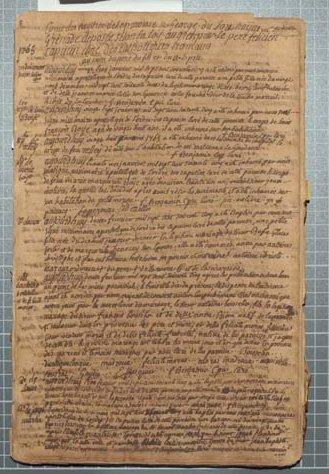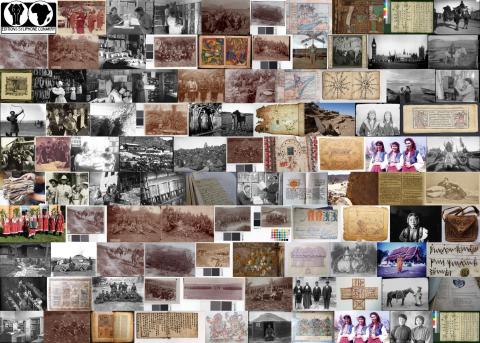
Aims and objectives
This project seeks to digitise the unique historical archives of Grenada which record the island's significance at the intersection of the British and French Empires during the second half of the eighteenth century, and provide a rare vision of how the Windward Islands experienced the transition from slavery to emancipation during the mid-nineteenth century.
The project focuses on digitising 132 volumes of deed records and local government correspondence which provide a crucial source for understanding the major political, social and economic transformations of the Southern Caribbean. These rare sources can also be used to reconstruct the experiences of the everyday and subaltern lives.
The material provides a micro-vision of how Grenada was transformed in the late eighteenth century by imperial conflicts, the expansion of plantation slavery and revolutionary politics. The Supreme Court records reveal the multi-racial alliances and conflicts that marked slave society while Government House correspondence expresses the local negotiations and conflicts that shaped the prolonged transition to a free society during the mid nineteenth century. The French Records are held in a storeroom of the registry and have suffered considerably from heat, humidity, fading and corrosion. The papers are extremely brittle, the text is beginning to discolour, and the bindings are in danger of damage due to cramped storage conditions.
Government House correspondence was displaced by Hurricane Ivan which resulted in significant loss, and the disruption of its original listing order. The Public Library lost parts of its roof in 2004 which have yet to be fully repaired. Its fragmented newspaper holdings are extremely rare.
The French Deed Records provide a unique vision of the social complexity of Grenadian society as it was being transformed into a plantation colony during the late eighteenth century. They provide a valuable source for tracing the personal trajectories of migrants from Africa, Europe and elsewhere in the Caribbean and for understanding how the social and economic relationships between Grenada's white, black and large mixed race population were being transformed during this period. The Letter Books of Grenada's Colonial Secretary offer a detailed narrative of local events which is particularly significant given the limited and fragmented collections of local newspapers held by Grenada's Public Library and the British Library. These papers provide a revealing counterpoint of local debates to the official correspondence of the Governor held in the National Archives at Kew. The inter-island correspondence of the Governor in Chief of the Windward Islands during the transition of emancipation is a crucial source for social, political and economic history of the Southern Caribbean, which has remained unused by historians despite the excellent scholarship of Woodville Marshall and Bridget Brereton on the region.
Digitising these records would enable public and scholarly access to these materials not only in Grenada and Britain, but also elsewhere in the Southern Caribbean, where these records would be of considerable interest in St Vincent, St Lucia, Martinique and Trinidad.
The project will begin with the newspaper collection of the Grenada Public Library as this allows for a small discrete collection through which project members can be trained in best practice for digitisation and the management of meta-data. During the second third of the project the French Deeds will be digitised while the archival researcher re-orders the Government House correspondence in preparation for later digitisation.
Digital copies of the rare deed records, local government correspendence and local newspapers will be deposited with the National Archives of Grenada and the British Library; the Government House correspondence and Registry records will be ordered and preserved in archival boxes; a digital photographer and archival researcher will be trained in current best practice; and two training sessions on best practice in digitisation and digital records management will be open to relevant professionals within and outside Grenada - it is hoped these would attract public sector personnel from across the Eastern Caribbean.
The project has the full support of the University of the West Indies and the Grenada National Archives, with Dr Curtis Jacobs and Ms Lillian Sylvester project co-applicants from these respective institutions.The Grenada National Archives Committee intends that within the life of this project the Grenadian government will have authorised the construction of a new National Archive building which would be the repository for the originals and digital copies generated by this project.
Outcomes
Before this project, the material from Government House that had survived the 2004 hurricane had been deposited in the basement of the Office of the Governor-General but there was no index, or order to the material. In totally reconstructing this archive the project relied heavily on E.C. Baker’s A Guide to Records in the Windward Islands (1968). All the Government House material was cleaned, repaired, placed in chronological and thematic order and indexed.
Twelve volumes and files of Governor and Lieutenant-Governor’s correspondence were digitised covering the period 1764-1879. The Letter Books of the Administrator and Colonial Secretary were digitised as series P because these were far more fragmented than the Governor’s correspondence. Without an item-level index of material dating from before the 2004 hurricane, series P material has been ordered chronologically and digitisation was focused on those works which were seen as the most fragile due to their age or unbound condition.
The material at the Supreme Court Registry was far better preserved than at Government House as it was relatively unaffected by Hurricane Ivan. Loose-leaf documents previously identified as connected to the eighteenth century French Deeds formed the initial focus of in situ digitisation in the Supreme Court Registry. Many of the bound volumes of French Deeds identified by the project required such extensive preservation and conservation work that their digitisation would have destroyed their physical structure. By stabilising their storage and digitising those materials in the Supreme Court Registry which were already fragmentary or fragile, the project was able to make a significant step towards its original aims.
Digitisation also continued in the Supreme Court Registry on the Births, Deaths and Marriages Registers for St Georges and records related to Forfeited Estates, 1794-1802. During this time one of the Archival researchers employed by the project cleaned, sorted and ordered the French Deed bound volumes and unbound materials.
Copies of all digitised material were deposited with the British Library and with the University of the West Indies, Grenada campus, and this will be made publically accessible through the new campus that is being constructed on the island. Copies of all digitised material will also be deposited with the National Archives when this is constructed.
The records copied by this project have been catalogued as:
- EAP295/1 Collection of correspondence relating to the Governor and Lieutenant-Governors held at Government House, Grenada. [1764-1897]
- EAP295/2 Collection of court records held by the Grenada Supreme Court Registry. [1765-1797]
Transcription of EAP295/2/6/1: Court of Oyer and Terminer for Trial of Attained Traitors record book [1796] (PDF doc 1.01MB)





